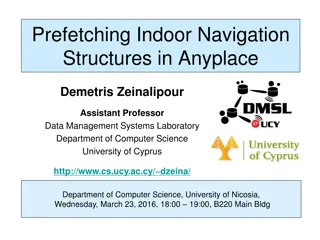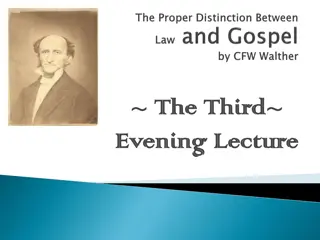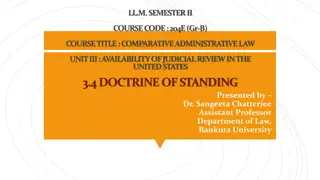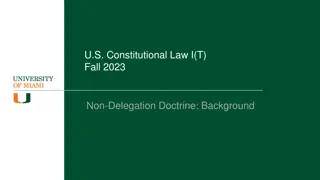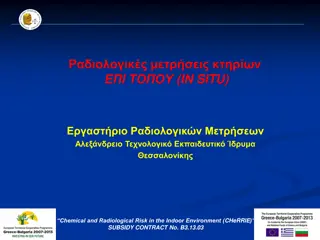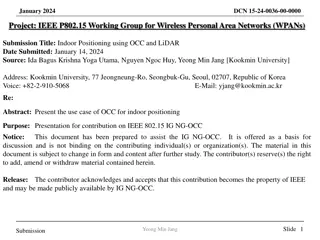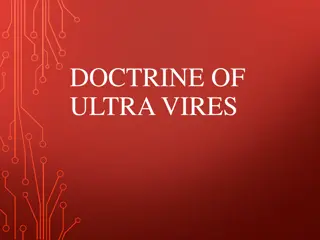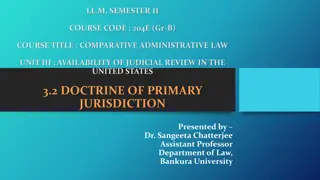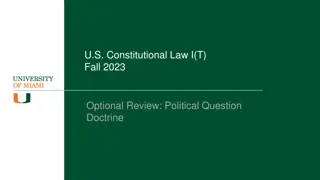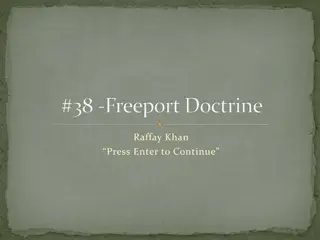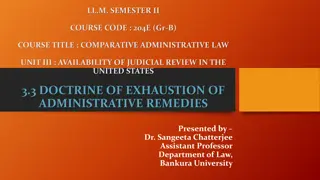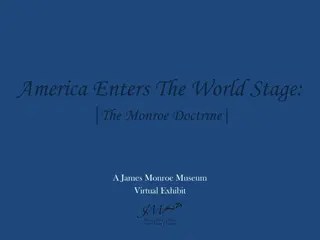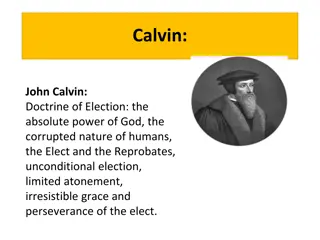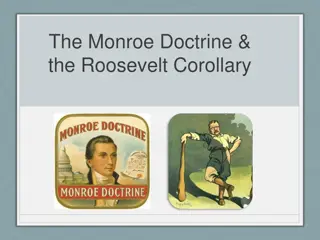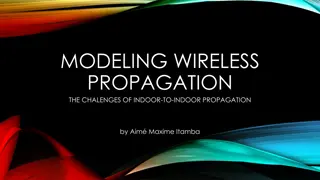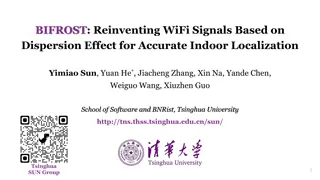Understanding the Doctrine of Indoor Management
Doctrine of indoor management implies that a company's internal affairs are its responsibility, allowing outsiders to assume that directors act within their apparent authority. This doctrine, originating from the case of Royal British v/s Turquand, protects outsiders under certain conditions. Constructive notice, a related concept, presumes that individuals are aware of certain facts or obligations even if not explicitly informed. Exceptions to the doctrine of indoor management exist, adding nuance to its application in corporate settings.
Download Presentation

Please find below an Image/Link to download the presentation.
The content on the website is provided AS IS for your information and personal use only. It may not be sold, licensed, or shared on other websites without obtaining consent from the author. Download presentation by click this link. If you encounter any issues during the download, it is possible that the publisher has removed the file from their server.
E N D
Presentation Transcript
DOCTRAINE AND EXCEPTION OF INDOOR MANAGEMENT
WHAT IS DOCTRAINE OF INDOOR MANAGEMENT? Doctrine of indoor management means that a company s indoor affairs are the company s problem. Rule of indoor management is important to people dealing with a company through its directors or other persons. They can assume that the members of the company are performing their acts within the scope of their apparent authority. Hence, if an act which is valid under the Articles, is done in a particular manner, then the outsider dealing with the company can assume that the director/other officers have worked within their authority.
ORIGIN ROYAL BRITISH V/s TURQANAD The directors of the company borrowed some money from the plaintiff. The article of the company provides for the borrowing of money on bonds but there was a necessary condition that a resolution should be passed in general meeting. Now in this case shareholders claims that as there was no such resolution passed in general meeting so the company is not bound to pay the money. company is bound to pay back the loan. As directors could borrow but subjected to the resolution, so the plaintiff had the right to infer that the necessary resolution must have been passed. It was held that the
If an act is authorized by the Memorandum or Articles of Association, then the outsider can assume that all detailed formalities are observed in doing the act. This is the Doctrine of Indoor Management or the Turquand Rule. This is based on the landmark case between The ROYAL BRITISH AND TURQAND Doctrine of indoor management, popularly known as the turquand s rule initially arose from 150 years ago in the context of the doctrine of constructive notice. The rule of doctrine of indoor management is opposed to the rule of constructive notice. The latter seeks to protect the company against the outsider while the former seeks to protect the outsiders against the company.
What is constructive notice? constructive notice is implied or indirect notice, which is not received in reality but in the eyes of law it is been served. Which means law is putting obligations, it is been presumed that you have the knowledge regarding that particular fact. Or the notice is been served to you. For e.g. AIRTEL when you log in to the site of Airtel, on that site every information regarding the Memorandum or Articles or certificate of incorporation is been clearly stated if anybody who is interested in the deal with the company should read all the particulars, if any problems arises after dealing with the company you cannot say that you have not been told earlier it is the duty of the outsider to read the memorandum or articles of that particular company in which you are dealing.
EXCEPTION TO DOCTRINE OF INDOOR MANAGEMENT - The rule of doctrine of indoor management is however subject to certain exceptions. In other words, relief on the ground of indoor management can t be claimed by an outsider dealing with the company in the following circumstances. Where the outsider has knowledge of irregularity Suspicious of irregularity Forgery Representation through articles Acts outside the apparent authority
KNOWELDGE OF IRREGULARITIES The first and the most obvious restriction is that the rule has no application where the party affected by an irregularity had actual notice of it. Knowledge of an irregularities may arise from the fact that the person contracting was himself a party to the inside procedure. DEVI DATT MAL VS THE STANDARD BANK OF INDIA where transfer of shares was approved by two director, one of whom within knowledge of transferor was disqualified by reason of being transfer himself and other was never validly appointed, the transfer was held to be ineffective.
SUSPICION OF IRREGULARITIES The protection of TURQUANAD RULE is not available where the circumstances surrounding the contract are suspicious and therefore invite injury. For example Suspicion should arise, from the fact that an officer is purporting to act in matter, which is apparently outside the scope of his authority. Anand Bihari Lal v. Dinshaw & co The plaintiff accepted a transfer of a company s property from its accountant, the transfer was held void. The plaintiff could not have supposed, in absence of a power of attorney, that the accountant had authority to effect transfer of the company s property.
FORGERY Forgery may in circumstances exclude the Torqued Rule . The only clear illustration is found in the Ruben v Great Fingal Consolidates Here in this case the plaintiff was the transferee of a share certificate issued under the seal of the defendant s company. The company s secretary, who had affixed the seal of the company and forged the signature of the two directors, issued the certificate.
REPRESENTATION THROUGH ARTICLES The exception deals with the most controversial and highly confusing aspect of the Turquand Rule . Articles of association generally contain what is called power of delegation . Lakshmi Ratan Lal Cotton Mills v J.K. Jute Mills Co. explains the meaning and effect of a delegation clause . Here one G was director of the company. The company had managing agents of which also G was a director. Articles authorized directors to borrow money and also empowered them to delegate this power to any or more of them. G borrowed a sum of money from the plaintiffs. The company refused to be bound by the loan on the ground that there was no resolution of the board delegating the powers to borrow to G. Yet the company was held bound by the loans. Even supposing that there was no actual resolution authorizing G to enter into the transaction the plaintiff could assume that a power which could have been delegated under the articles must have been actually conferred. The actual delegation being a matter of internal management, the plaintiff was not bound to enter into that.
CONCLUSION The doctrine of indoor management is evolved as a reaction to the doctrine of constructive notice. It puts a Barr on the doctrine of constructive notice and it protects the third party who acted in the act in the good faith. This doctrine protects outsiders dealing or contracting with a company, It was analyzed that the doctrine does not operate in an arbitrary manner, there are some restriction imposed on it like forgery, third party having knowledge of irregularity, negligence, where the third party don t read memorandum and articles and the doctrine will not apply where the question is regarding of to the very existence of the company.




